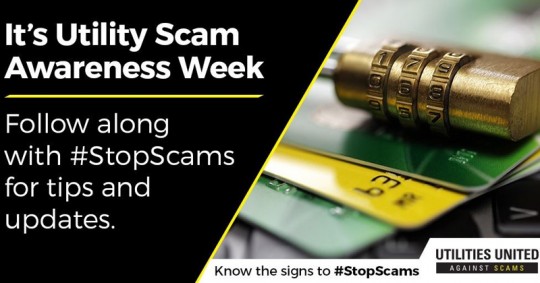It’s Utility Scam Awareness Week. Here’s Why That’s A Thing And How To Protect Yourself.
November 17, 2020
Utility customers are frequent targets of scam attempts, and Utility Scam Awareness Week, Nov. 16-20, offers a chance to raise awareness and help educate customers on the tactics used by scammers.
Recognized annually, Utility Scam Awareness Week was created by Utilities United Against Scams (UUAS), a consortium of 145 U.S. and Canadian electric, water and natural gas companies and their respective trade associations. Gulf Power and Florida Power & Light are members of the UUAS.
“Protecting yourself against scams is a constant battle unfortunately, but we want to help make our customers aware of some of the more common tactics that scammers use so they can protect themselves,” said Marlene Santos, Gulf Power president. “Heightened awareness is one of the best defenses against these activities.”
UUAS and its member companies have seen an increase in scam attempts upon customers due to the pandemic. In fact, many tactics being used are claiming COVID-19 as a reason to gain access to personal information.
Although impostors continue to target utility customers, UUAS has succeeded in taking nearly 6,000 toll-free numbers out of operation with the help of customer reporting. UUAS advises customers who suspect that they have been victims of fraud or who feel threatened during contact with a scammer to contact their local utility or law enforcement authorities. Here are tips to protect yourself from falling victim to utility scams:
Signs of potential scam activity:
- Threat to disconnect: Scammers may aggressively tell a customer their utility bill is past due, and service will be disconnected—usually within an hour—if a payment is not made.
- Request for immediate payment: Scammers may instruct a customer to purchase a prepaid card, cryptocurrency or to send funds via a mobile app to make a bill payment.
- Request for prepaid card: Customers are instructed to pay with a prepaid debit card. The impostor asks the for the prepaid card’s number, which grants instant access to the card’s funds.
How customers can protect themselves:
- Customers should never purchase a prepaid card to avoid service interruption. Utility companies do not ask for a prepaid card and always offer a variety of ways to pay a bill.
- If someone threatens immediate service interruption, customers should be aware. Customers with past due accounts receive multiple advanced notices, typically by mail or email and in their regular monthly bill.
- If customers suspect someone is trying to scam them, they should hang up, delete the email or shut the door. The utility should be contacted immediately at the number on the most recent monthly bill or on the utility’s official website, not the phone number the scammer provides. If customers ever feel that they are in physical danger, they should call 911.




Comments